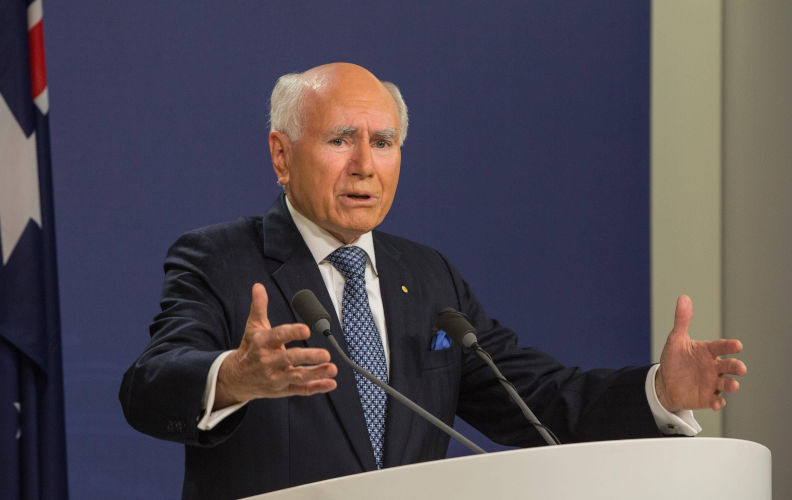The magic of the mandate: Now you see it, now you don’t
July 5, 2025
In 2003, then prime minister John Howard committed Australia to the US-led invasion of Iraq.
It was one of the most divisive foreign policy decisions in recent Australian history. Hundreds of thousands across the country marched in protest, rejecting what many believed was a war built on false premises and driven by blind loyalty to Washington.
Faced with this massive public opposition, Howard offered a pointed defence: he had won a decisive election and thus had the “mandate of the Australian people”. That electoral victory, he argued, gave him the democratic authority to make hard decisions, even unpopular ones –like sending Australian troops to war.
But this assertion raised a fundamental question: does winning an election give a leader carte blanche to ignore the public will on issues as grave as war and peace? Howard’s use of the term “mandate” appeared less about listening to the people and more about shielding a predetermined policy behind a wall of democratic legitimacy.
Now, two decades later, Australia finds itself in another moral crisis – one involving foreign aggression, global outcry and silence from the nation’s leaders. But this time, the roles have been strangely reversed.
Prime Minister Anthony Albanese leads a Labor Government with firm parliamentary control and a broadly supportive electorate. While his victory in 2022 was not a landslide, it was clear and conclusive. That mandate was renewed in the 2025 election, further consolidating his leadership and reaffirming public confidence in his government’s agenda. He governs from a position of strength, with a platform grounded in principles of justice, human rights, and multilateral co-operation.
Labor has long spoken of recognising a Palestinian state. It has committed itself rhetorically to a two-state solution and has condemned illegal settlements. These positions resonate with Australia’s professed support for international law and order.
Yet, in the face of sustained and widely condemned Israeli military action in Gaza, including what human rights organisations describe as collective punishment and possible war crimes, the Albanese Government has chosen a path of timidity. As death tolls rise and footage of destroyed hospitals and displaced civilians fills global screens, Australia’s official response has been evasive: vague calls for de-escalation, balanced statements urging “restraint on both sides”, and abstentions at critical United Nations votes.
This restraint stands in stark contrast to the moment’s moral urgency. Countries such as Ireland, Norway and Spain have stepped forward to formally recognise the state of Palestine. Even in traditionally cautious diplomatic environments, the language of condemnation and accountability has become more direct. Australia, however, remains perched uncomfortably on the fence.
What we are witnessing is a paradox. Where Howard invoked his mandate to force through a morally questionable military intervention, Albanese is refusing to use his to take a principled stand against occupation and apartheid. The result is a peculiar kind of political theatre: one prime minister acts boldly in defiance of public opposition; the other governs passively, despite having both public support and international cover for moral leadership.
The difference highlights a deeper issue: mandates are not moral compasses. They are instruments – tools of legitimacy. And tools can be employed for justice or ignored out of convenience.
In Albanese’s case, the mandate has become a missed opportunity. If Labor’s support for Palestinian statehood is sincere, why does Australia continue to abstain from recognising that state on the world stage? If the government believes in a rules-based order, why does it hesitate to call out blatant violations of international law by an ally?
What both the Howard and Albanese examples reveal is that political courage is often selective, conditional, and shaped by strategic interests. For Howard, that courage manifested as defiant loyalty to the US. For Albanese, its absence reflects caution, alliance management, and fear of domestic or international backlash.
But while political calculation is an inevitable part of governance, silence in the face of humanitarian catastrophe is not neutrality – it is complicity.
Democracy is more than just casting votes. It demands accountability, responsiveness and moral clarity. A leader’s legitimacy doesn’t just rest on how he or she wins power, but on how he or she uses it when it matters most.
There is a painful symmetry in these two Australian moments – one in the early 2000s, the other unfolding now. Howard ignored a national outcry and acted. Albanese hears measured, but growing, protest and chooses inaction. The first moved decisively, even recklessly. The second moves cautiously, even passively.
In both cases, the idea of a “mandate” serves as a political mask – a way to deflect accountability rather than embody it. For Howard, it was a shield against dissent. For Albanese, it is an excuse for silence.
But mandates are not indefinite. Their power fades, and their moral weight is judged not in real time, but in retrospect. History tends to remember silence as sharply as it does action. And in the long arc of justice, doing nothing in the face of wrongdoing can be just as damning as doing the wrong thing.
If Albanese truly holds a mandate — if his government still believes in justice and international law — then now is the moment to act. Not for diplomacy, but for principle. Not for headlines, but for history.
The views expressed in this article may or may not reflect those of Pearls and Irritations..

